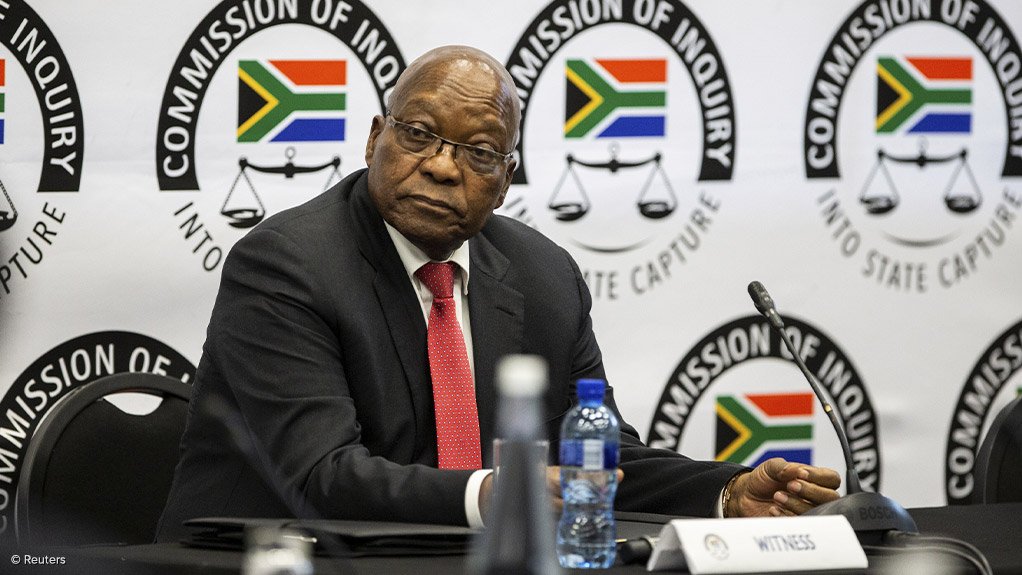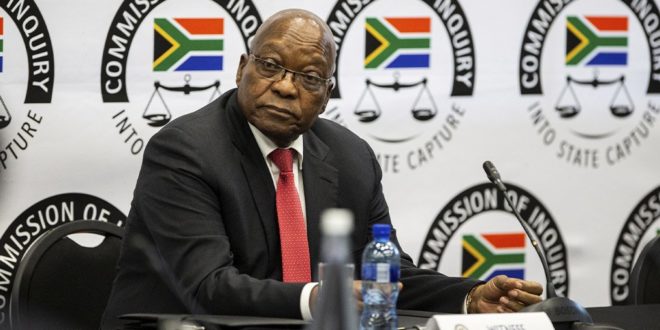
Former president Jacob Zuma has effectively dared the Constitutional Court to send him to prison for contempt as he continues to attack the legitimacy and integrity of South Africa’s judiciary.
But, at a time when the country’s judges most need to show a strong and united front, the Judicial Service Commission process has exposed just how deeply politicised and seemingly rudderless the judiciary has become.
Never was this more evident than in Chief Justice Mogoeng Mogoeng‘s headline-grabbing comments about his 2016 interaction with then-finance minister Pravin Gordhan – comments which almost certainly sunk Judge Dhaya Pillay‘s prospects of being nominated for a Constitutional Court position.
Pillay is currently serving as an acting justice at the Constitutional Court. She is also one of the justices who must decide whether Zuma should be convicted of contempt for failing to obey the court’s ruling that he appear before the state capture inquiry and answer non-incriminating questions and, more controversially, if he should be sentenced to jail time for that defiance.
As the judge who issued an arrest warrant for Zuma when he failed to arrive for his corruption trial and ruled he had defamed former minister Derek Hanekom by referring to him as a “known enemy agent”, she also has a massive target on her back.
In a 21-page letter sent to Mogoeng on Wednesday, Zuma took specific issue with the fact that Pillay is one of the judges who will decide his fate in the inquiry’s contempt case against him. Zuma has described her as “a judicial officer whose judicial antipathy towards me is well-recorded in a court judgment and an order for my arrest while I was in hospital”.
Pillay had issued a suspended order for Zuma’s arrest after his lawyer produced what she regarded as inadequate evidence of his alleged ill-health when he failed to attend one of his corruption trial hearings. Her order was subsequently lifted.
“I found the participation of acting Justice Pillay particularly disturbing and a clear indication of her unmitigated lack of discretion and a deeply irresponsible exercise of judicial power,” Zuma stated in his letter to Mogoeng, in a repeat of criticism he has previously levelled at the judge.
Economic Freedom Fighters (EFF) leader Julius Malema had taken up Zuma’s cause during Pillay’s Constitutional Court interview on Tuesday, by referring to her as “nothing but a political activist” who belonged to Gordhan’s faction. Pillay, who had acknowledged she and Gordhan had become friends during the anti-apartheid struggle in Durban, denied this.
Mogoeng, however, did not let the matter lie there and related how Gordhan – then the finance minister – had asked for a meeting with him, he recalled, in relation to the Tax Ombud. At the time, the JSC had just conducted interviews and Pillay had applied for a position at the Appeal Court.
“But what stuck in my mind was he asked me a question: ‘How did my friend Dhaya Pillay perform?’
“We had just announced the results, it was public knowledge that you did not make it. This thing has stayed with me. It got renewed as Malema engaged you.
He said, “Why did the minister make an effort to meet me? We are not friends. I don’t know him from anywhere except from television. Why did he make a trip to seek an audience with me to ask me how did ‘my friend’ perform?”
“Is it potentially compromising to judicial independence and impartiality for a minister or a senior politician to be keenly interested in the upward mobility, or to look like he or she is interested in the upward mobility of a judge?” Mogoeng asked.
Pillay said she was not aware of the interaction and Mogoeng acknowledged Gordhan had simply asked how she had done, and did not say “anything like ‘you should appoint her'”.
But the damage was already done.
The EFF announced it would lay criminal charges against Gordhan for “abusing his authority in attempting to influence the Chief Justice Mogoeng Mogoeng in the appointment of Dhaya Pillay as a judge”.
Gordhan has since written to the JSC, confirming he had met with Mogoeng on 6 April 2016 in connection with a range of official matters and “after the completion of the cordial discussion on the matter for which the meeting was requested, I, in passing, did refer to Judge Pillay’s interview with the JSC”.
“Although, like the CJ [chief justice], I cannot recall the content of the meeting, I did not meet the chief justice to discuss Judge Pillay. The enquiry about Judge Pillay was purely incidental to the purpose of the meeting.
“In any event, as the chief justice himself indicated at the JSC, by the time I met him to discuss one or more of the matters outlined above it was public knowledge that you [Judge Pillay] did not make it.
“I want to state emphatically that I would never, and nor did I in any way, seek to influence the chief justice, whose independence I have always respected.”
The Office of the Chief Justice has not responded to requests for comment from Mogoeng on Gordhan’s letter to the JSC. Nor has he revealed whether, if he believed that the minister was trying to influence him, he did not report this clearly unlawful act to the authorities.
Lawson Naidoo from the Council for the Advancement of the SA Constitution said it was apparent Mogoeng “was loose with the facts in explaining the circumstances of his conversation with Gordhan, leaving it open for speculation as to whether there was an attempt to influence or not”.
“The chief justice of all people knows that it was the practice of the JSC to forewarn candidates about potentially controversial questions they may face so that they have an opportunity to prepare a response. That clearly did not happen here.”
Lastly, Naidoo pointed out, if Mogoeng had concerns about Pillay and her political affiliations, it was strange he would have supported her in serving as an acting judge at the Constitutional Court.
Constitutional law Professor Richard Calland agrees and said Mogoeng’s intervention in Pillay’s interview effectively opened a “front of assault” on her that torpedoed her prospects of ascending to the Constitutional Court.
It was unfortunate that, by doing this, the chief justice had politicised the JSC process he was meant to protect, Calland added.
While willing to stoke a storm of controversy over Gordhan and Pillay’s relationship, Mogoeng and the JSC he leads have seemingly been far more hesitant to deal quickly and decisively with the damning gross misconduct finding made against Western Cape Judge President John Hlophe.
JSC spokesperson Dali Mpofu told News24 there was nothing special about the Hlophe case – which has taken 13 years to finalise – and it did not feel any pressure to make a finding on whether he should be impeached.
Hlophe has been found guilty of attempting to influence Constitutional Court justices Bess Nkabinde and Chris Jafta to rule in then-ANC president Zuma’s favour in his 2008 challenge to the search warrants used to seize 93 000 pages of corruption trial evidence against him.
The JSC’s lack of urgency in making a decision on whether it will endorse the Judicial Conduct Tribunal’s report on Wednesday saw the Cape Bar writing to the JSC to ask that the interviews of prospective Western Cape High Court judges be postponed so that the commission could be “used to deliberate and decide on the report” of the Tribunal.
The Cape Bar contended this interview process “should resume only after the JSC has made its finding” on the report and any representations made in response to it by Hlophe and the Constitutional Court.
“Such a course will also ensure that the serious findings of the Judicial Conduct Tribunal do not taint the judicial appointment process to the Western Cape High Court,” it added.
“Any further delays in the process going forward will only serve to undermine the integrity of the judicial system and public confidence in it, consequences that threaten the core of our constitutional democracy.”
While the JSC has yet to take an official position on the request from the Cape Bar, Malema responded in a tweet that simply stated “it will not happen”.
The JSC interviews continue on Thursday with no sense of when the commission will meet to finalise its response to the Hlophe Tribunal finding.
Hlophe’s attorney, Barnabas Xulu, has, meanwhile, released a statement condemning the Tribunal’s findings as unjustified and driven by political motives – and suggesting, very strongly, the judge president would challenge it in court.
Source: polity.org.za
 Home Of Ghana News Ghana News, Entertainment And More
Home Of Ghana News Ghana News, Entertainment And More





